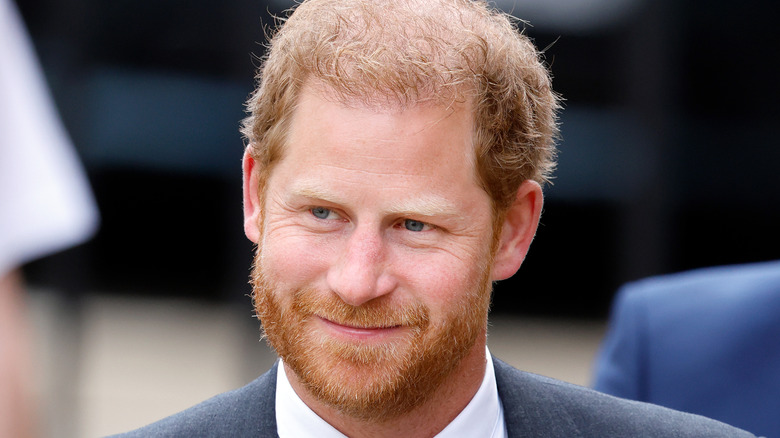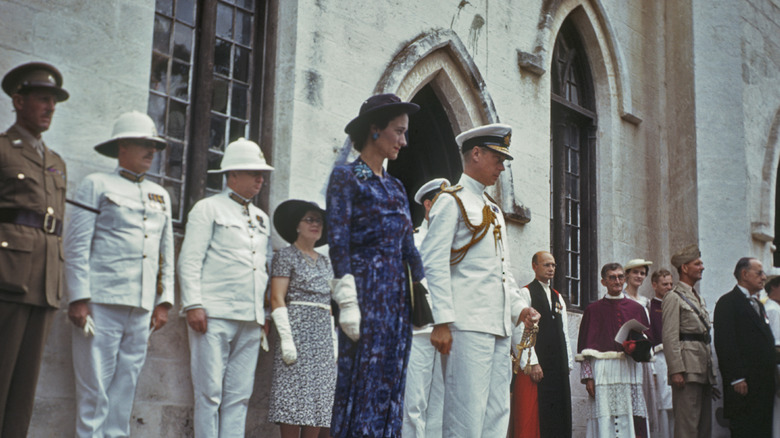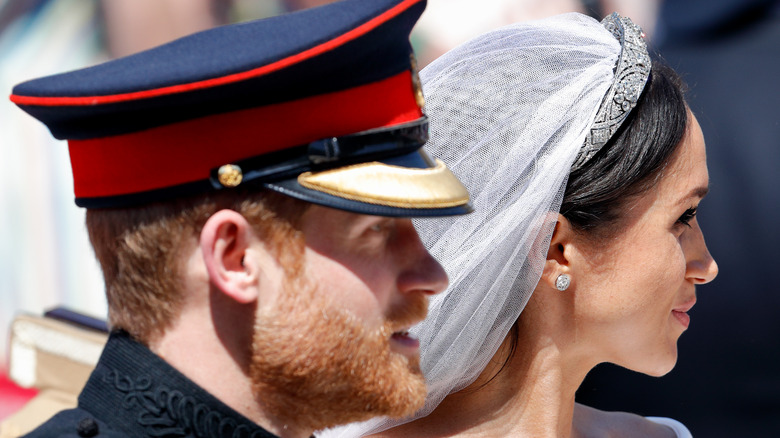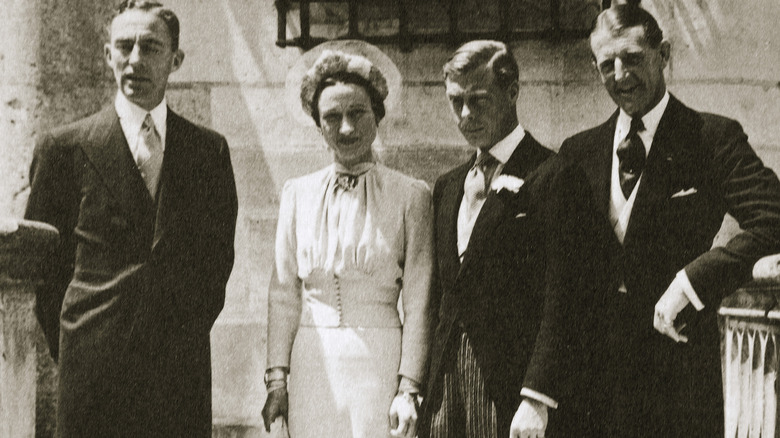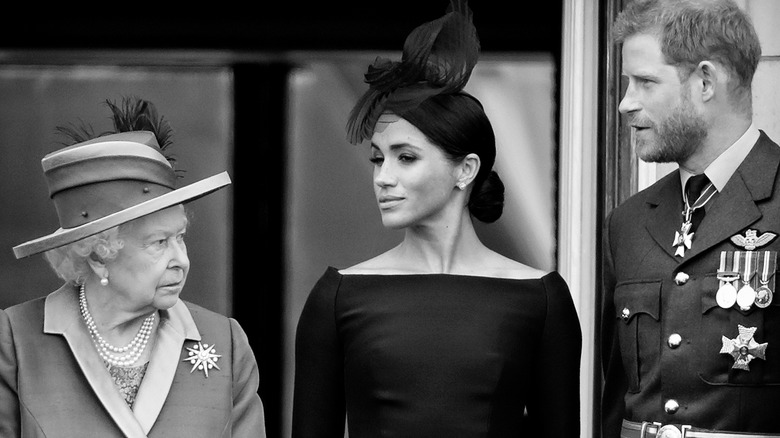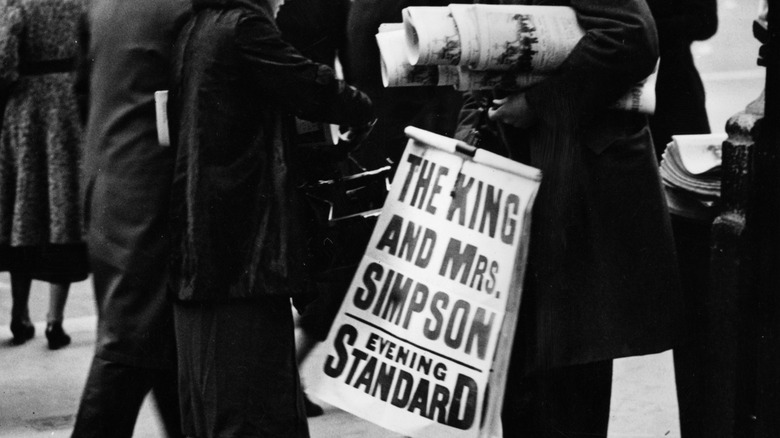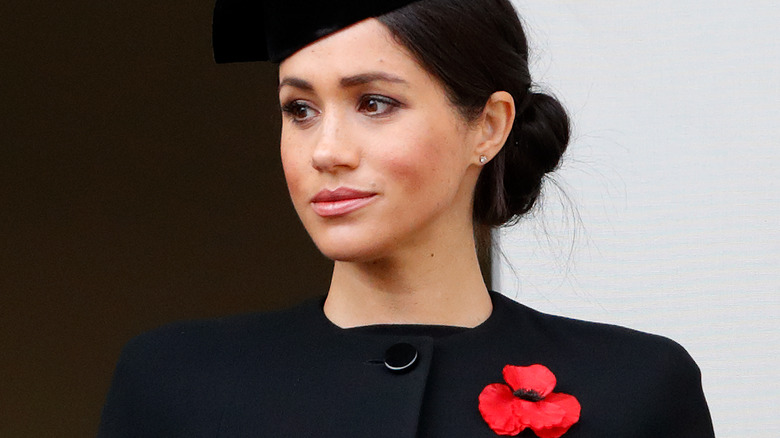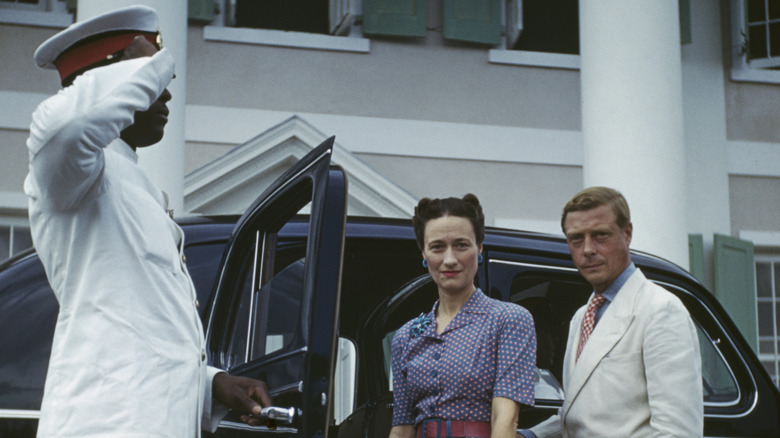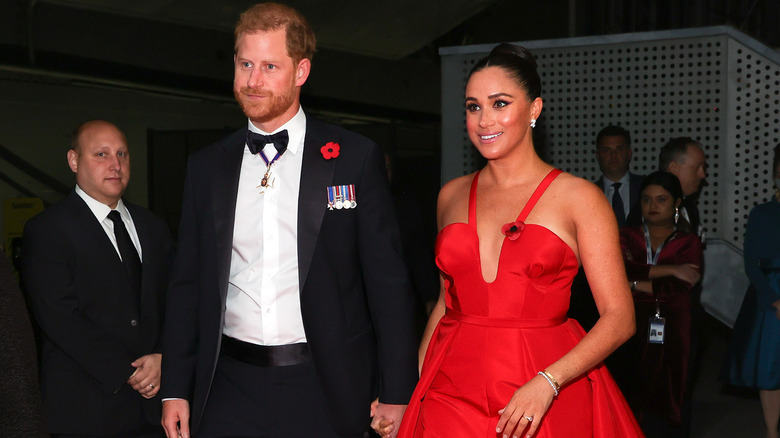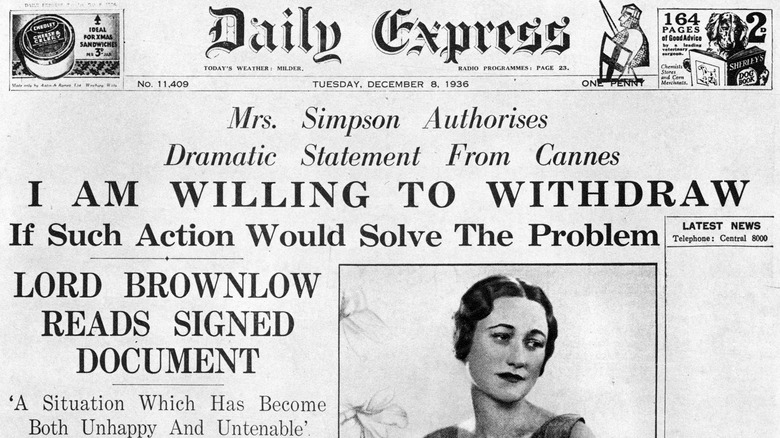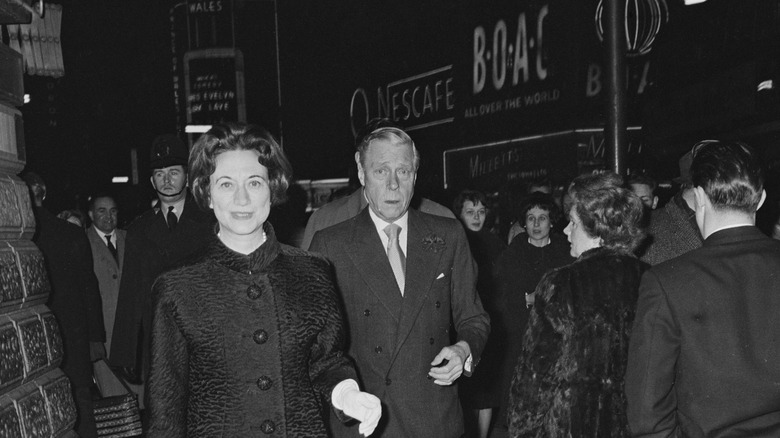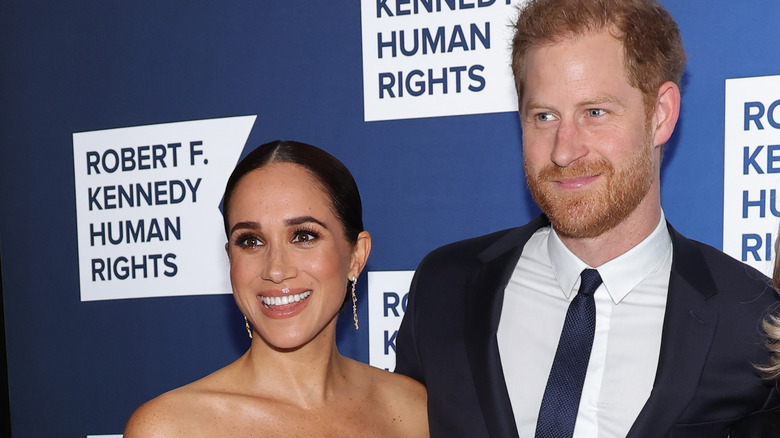The One Royal Prince Harry Has A Lot In Common With
These days, Prince Harry might seem like the ultimate royal rebel. After all, the 2023 publication of his tell-all memoir, "Spare," left the royal family in chaos. The book contains bombshell allegations against the British royal family, claiming that Prince William has something of a temper and that King Charles III failed to hug Harry when Princess Diana passed away. Among the most revealing allegations, though, was that William and his wife, Princess Catherine, actually encouraged Harry to wear the Nazi uniform that landed him in an international media scandal back in 2005. The seriousness of Harry's account has reportedly been so upsetting for the rest of the royal family that some sources imply William has refused to speak with him.
While "Spare" might make Harry look like the most rebellious royal of all time, that's not exactly true. Long before the Duke of Sussex told his story to the world, another royal published his own tell-all, detailing his forbidden romance. In 1951, King Edward VIII's memoir "A King's Story" hit the market, giving the public a glimpse into his controversial decision to abdicate the throne in order to marry an American woman named Wallis Simpson. Like Harry, Edward fell in love with a foreigner who did not fit into the constraints of palace life. But the similarities between the two royals don't stop there. From their views on love to their struggles with the press, Prince Harry and King Edward had a whole lot in common.
Both Edward and Harry witnessed loveless royal marriages
Prince Harry and King Edward VIII were born almost a century apart, yet they noticed many of the same social patterns. Especially when it came to love and marriage, both men observed that plenty of upper-class couples were ill-matched. For example, in his book, "A King's Story," Edward noted that many aristocratic and royal Brits married for convenience. He himself vowed to avoid this kind of relationship at all costs, writing: "I was determined under no circumstances to contract a loveless marriage, the question did not arise. I had seen too many unhappy unions of this kind to wish to risk one myself."
Apparently one of the worst parts of these unhappy royal relationships, in Edward's view, was that it was difficult to get a divorce. He even noted that kings were particularly bound to the rules of decorum, asserting that "my particular circumstances would have made the dissolution of an inharmonious partnership almost impossible."
Just like his great-granduncle, Harry grew up witnessing the drama of an unhappy royal union. His own parents, Princess Diana and King Charles III, wed out of duty to the crown, only to be miserable together. "As we now know, it was almost a sort of medieval arranged marriage," noted royal expert, Ann Morrow (via YouTube). Unfortunately, this ended in a very public divorce that certainly impacted Harry's view of marriage.
Neither man wanted to marry for convenience
Perhaps because of their exposure to the lovelessness of upper-crust unions, neither Prince Harry nor King Edward VIII wanted to marry for convenience. As the heir to the throne, Edward was particularly worried about this issue. In "A King's Story," he wrote: "From the first, I was determined that my choice of a wife would be determined not by considerations of state but my own heart."
This statement was particularly rebellious for the standards of the time. During Edward's era, it was common for families to arrange unions to preserve their bloodlines. Edward, however, was against these practices — at least on a personal level. In his memoir, he revealed: "The idea of an arranged marriage was altogether repugnant to me; moreover, the idea of such a union as a means of maintaining the purity of the royal line no longer offered so wide a range of choice as in the past."
Interestingly, by the time Harry began dating, the pressures to maintain the royal bloodline had substantially subsided. Even so, the redheaded prince observed that royal men felt an obligation to marry women who were seen as suitable for palace life. "For so many people in the family, especially obviously the men, there can be a temptation or an urge to marry someone who would fit the mold as opposed to somebody who you perhaps are destined to be with," Harry explained in the documentary series "Harry & Meghan" (via Insider).
Harry and Edward fell in love with American divorcées
In spite of all odds, both Prince Harry and King Edward VIII fell for women that shared a number of startling characteristics. Harry's bride, Meghan Markle, and Edward's wife, Wallis Simpson, were both American women. And, in the view of the British royal family, both women's pasts were less than ideal due to the fact that they had already been married prior to meeting their royal beaus.
Fascinatingly, however, there was one major factor distinguishing Edward's romance from Harry's. Unlike Meghan, who filed for divorce before ever crossing paths with Harry, Wallis was actually still married to another man at the time when Edward fell for her. Naturally, this made her romance with the king doubly scandalous. According to "A King's Story," Edward actually met with the editors of British tabloids when Wallis finally petitioned for a divorce, begging them not to go too hard on her in the papers. While they ultimately agreed to Edward's terms, American papers did not. Some U.S. outlets even reported that Wallis was already secretly plotting her marriage to the king.
When compared to the beginning of Edward's marriage to Wallis, Meghan and Harry's love story might seem much less dramatic — at least, at the beginning. The Duke and Duchess of Sussex met on a blind date in 2016, a full three years after Meghan divorced her first husband, Trevor Engelson.
The royal family didn't initially approve of either match
Because Wallis Simpson and Meghan Markle were both American and divorced, they didn't exactly fit the royal mold. Thus, it was hardly astonishing that the royal family didn't initially find either woman suitable for palace life.
In King Edward VIII's day, the implications of marrying a divorcée were even more intense than they would have been for Prince Harry. The reason, according to "A King's Story," pertains to the fact that any British monarch is, at the time of their reign, also the head of the Church of England. "Divorce is not recognized by the Church of England, of which the King as Defender of the Faith is the titular head," Edward explained in his memoir. "Even as late as my grandfather's era the rule was that no divorced person, even the innocent party, would be received at court." Consequently, the idea of a divorced queen was not only unthinkable; for many Brits, it was also blasphemous.
By the time Harry got engaged, Meghan's status as a divorcée wasn't nearly as dramatic. Indeed, the ban on divorced people in court had long passed, and King Charles III had already married Camilla, Queen Consort — making her Britain's first divorced queen. However, there was a different reason why the royal family didn't like Meghan. As Harry revealed in the docu-series "Harry & Meghan," some royals thought: "Oh, she's an American actress, this won't last" (via Yahoo!).
Edward and Harry both watched their partners suffer from media attention
Marrying into a royal family is tough, but few people understand how taxing it is. Unlike King Edward VIII or Prince Harry, who were born into the spotlight, Wallis Simpson and Meghan Markle were confronted with it later in life. Subsequently, both women suffered from the constant press attention.
Writing in "A King's Story," Edward noted his own comfort with the press: "Publicity was a part of my heritage." Even so, the monarch was astonished to find the newspapers ripping apart his romance with Wallis. His own portrayal in the papers was so bad that he asked himself: "Could this be the King, or was I some common felon?" He recalled that Wallis was struck by the sensationalism that characterized their media portrayal: "The world can hold few worse shocks to a sensitive woman than to come without warning upon her own grossly magnified countenance upon the front page of a sensational newspaper."
Almost a hundred years later, Harry and Meghan experienced a comparable media frenzy. In the documentary "Harry & Meghan," the couple revealed that the stress of Meghan's new role contributed to the decline of her mental health. The duchess told filmmakers that she even considered suicide to escape the constant bombardment of the press: "All of this will stop if I'm not here" (via CNN).
If you or anyone you know is having suicidal thoughts, please call the National Suicide Prevention Lifeline at 1-800-273-TALK (8255).
They both believed that Meghan and Wallis' gender played a role in negative media portrayals
Gender plays a major role in how royal drama is reported. In the docu-series "Harry & Meghan," the Sussexes criticized the sexist dynamic in which Meghan Markle was blamed for Prince Harry's decision to distance himself from royal life. As Harry told filmmakers: "I've seen little cartoons of me on all fours and her holding a dog lead, and me wearing the dog collar. How predictable ... the woman is to be blamed for the decision of a couple. In fact, it was my decision. She never asked to leave. I was the one that had to see it for myself. But it's misogyny at its best" (via The Guardian).
Compellingly, this phenomenon where the woman is held accountable for public drama was alive and well back in the 1930s. Indeed, almost a century ago, Edward observed a similar dynamic — thanks to the advice of Wallis' aunt, Bessie Merryman. As he wrote in "A King's Story," Bessie helped him understand the role of gender in the public's perception of tabloid relationships, telling him: "It is usually said in situations of this sort that it is always the woman who wills the end ... Wallis will be blamed [if you choose to abdicate the throne], perhaps even more than you." Edward went on to recall that the older woman was concerned about her niece, who felt "bewildered" and "frightened" by the surmounting public scrutiny.
Like Meghan Markle, Wallis Simpson fled England due to media pressure
King Edward VIII and Prince Harry both watched their wives suffer at the hands of the media — to the point that both Wallis Simpson and Meghan Markle, respectively, fled the country. Wallis, in particular, felt a strong urge to escape Britain one morning, right after perusing the headlines of the daily newspapers. As Edward recalled in "A King's Story," the young American woman turned to him and said: "I cannot stay here another day, with all this going on. I must leave England this afternoon."
To give Wallis a bit of peace, Edward helped her arrange a trip to France. However, for fear of media stalking, the king's team kept Wallis' travel plans under wraps. "Because of the hue and cry that would be raised by the press if so much as a hint of Wallis' intention became known, preparations for her departure went forward with the utmost secrecy," Edward wrote. The couple was so worried that the British tabloids would discover their plans that Wallis decided not to travel during daylight hours.
Unfortunately, the British press has not improved much over the years. In the 21st century, Harry and Meghan struggled so much with negative press coverage that they, too, fled England. In the couple's famous interview with Oprah Winfrey, they were asked if the racism of the British media motivated them to leave the country. Harry responded: "It was a large part of it" (via the BBC).
Even abroad, these royal couples faced scrutiny
Fleeing the country, sadly, was not enough to liberate Wallis Simpson and Meghan Markle from the constant media scrutiny. Even in the 1930s, Wallis was hounded as she traveled through Europe. In "A King's Story," King Edward VIII recounted how the American fled England to go to Rouen, France, where she hoped to lay low on her way to a friend's home in Cannes. Even on the other side of the English Channel, however, Wallis was quickly identified by onlookers: "At Rouen, as they were leaving the hotel, Wallis was recognized in the lobby by a French woman; an actress, so the story goes, from the Comédie Française." Apparently, the actress "followed [Wallis] out of the hotel" and called out "Voilà la dame," or "There is the woman," in French. The American divorcée was then forced to depart the town in a rush.
Meanwhile, in the modern day, Meghan left the U.K. to get away from the media — only to have her hideaway surrounded by the paparazzi. As revealed in the documentary series "Harry & Meghan," the Duke and Duchess of Sussex headed to a remote location in Canada in search of peace. Speaking to filmmakers, Harry recalled: "There wasn't a single paparazzi that lives on Vancouver Island. That was the reason we chose it" (via Narcity). Nonetheless, photographers stalked the couple, using boats to approach their secluded home and sneak photographs of the couple. Effectively, there was no escape.
Both Edward and Harry felt voiceless amid the media frenzy
Because of the intensity of the media scrutiny, King Edward VIII and Prince Harry both came to feel as though they were voiceless in the recounting of their own respective stories. Indeed, in both of their cases, so many rumors abounded in the papers that neither Edward nor Harry necessarily felt that their perspectives were being heard. Writing in "A King's Story," Edward noted: "I realized as keenly as the next man that public opinion was bound to be distracted and confused. The crisis [of my romance with Wallis] had come with the violence of a thunderclap. Now everybody's voice would be heard but mine." He even admitted that he longed to go on air to take control of the narrative and tell his story publicly. "The feeling mounted in me that if only I could speak directly to the people [via radio], explaining what was on my mind, the confusion would be partly dissipated."
Unfortunately, Edward never had the chance to broadcast his perspective through a radio program. However, in the modern era, Harry did have the opportunity to share his story with the public. The prince was reportedly motivated in the Netflix docu-series, "Harry & Meghan," because he wanted to tell his story without any tabloid interference. As the Sussexes publicist, Ashley Hansen, said in a statement to The New York Times: "They are choosing to share their story, on their terms."
Neither Harry nor Edward wanted to leave royal life
While both Prince Harry and King Edward VIII had romantic relationships amid stressful circumstances, neither man specifically set out to leave royal life. As the King of England, Edward was particularly concerned with the possibility of abdicating. After all, his decision would change the future of the monarchy. In "A King's Story," Edward recalled his initial dream of both marrying Wallis and maintaining his seat on the throne: "Because I believed to the end that the innate reasonableness of the British public would prevail, I was determined to hold back from the final and irrevocable step [of abdicating] so long as there existed the faintest hope of my being allowed to present my case to them without a disastrous public disunity." Ultimately, however, he did not ask the people's permission to marry Wallis, choosing instead to set aside his crown.
A century later, Harry and Meghan reportedly searched for ways to dodge the media, all while remaining loyal to the royal family. In the Netflix documentary series, "Harry & Meghan," Harry revealed that, when the couple initially moved to Canada, they did so hoping to remain active in the firm: "We thought it would be good to give ourselves some breathing space, but also we were really passionate about continuing our work throughout the Commonwealth, to support the queen" (via Yahoo!). In the end, this strategy did not work, and the Sussexes quit their royal roles in 2020.
Both men exited the firm in order to be with the women they loved
In the end, King Edward VIII and Prince Harry both decided to take a step back from their royal roles, although neither man cut ties with the royal family entirely. In 1936, following much internal struggle, Edward did, ultimately, abdicate the throne in order to marry Wallis. As the monarch claimed in "A King's Story," he used to declare: "No marriage, no coronation!" And, indeed, that is what transpired. Of course, just because Edward stepped back from royal life, doesn't mean that he completely abandoned it. He remained the Duke of Windsor until his death and served for five years as the governor of the Bahamas.
Meanwhile, in the 21st century, Harry quit his career as a working royal. Nevertheless, he kept his titles, both as prince and the Duke of Sussex, and his children, Archie and Lilibet, are also known as Prince and Princess, respectively. In a "60 Minutes" interview with Anderson Cooper (via YouTube), Harry was asked why he hadn't renounced his titles. The prince responded: "And what difference would that make?"
